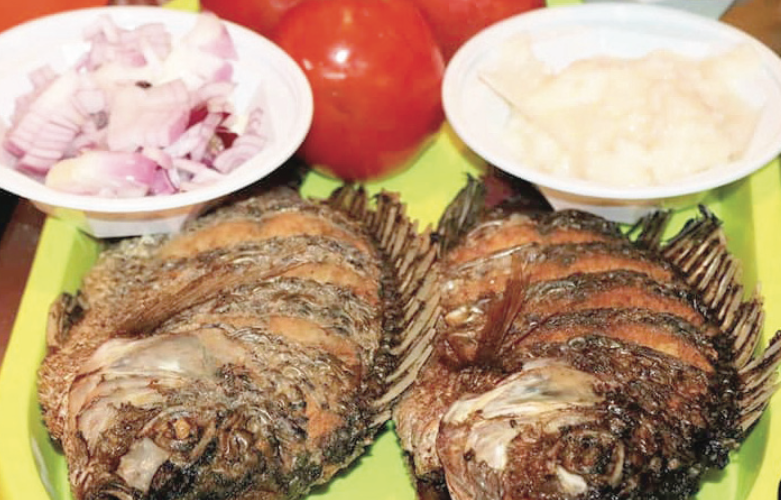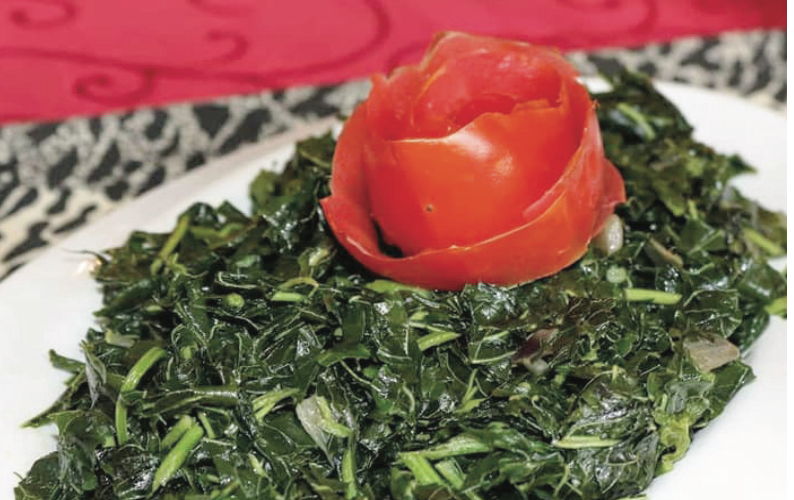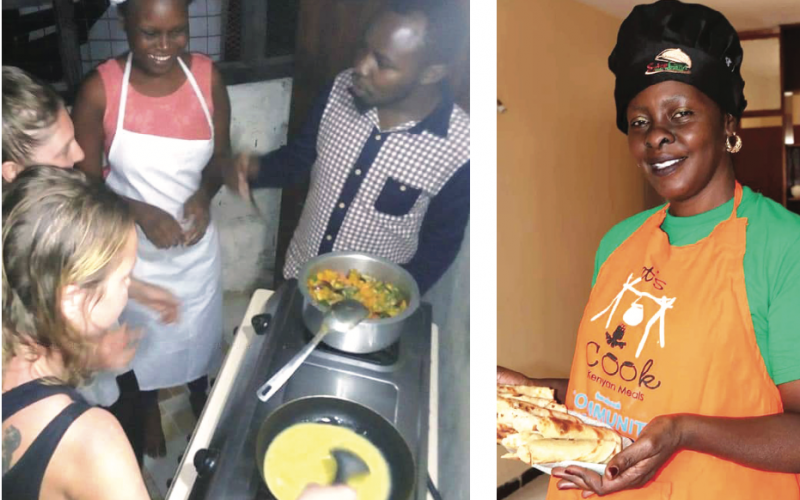How Kenya becoming a choice destination for those in search of food experiences

Some travel to escape the humdrum of daily life, others just want to see more of the world, yet for others, discovering unique cuisine in foreign lands is the driving force that makes the adventure worth the while. HARRIET JAMES tells us how Kenya is increasingly becoming a choice destination for those in search of food experiences, to discover and open their palates to new flavours, textures and heritage
Since he was 23, Daniel Quintana has been touring the world to learn about different cultures, particularly through food.
I met him during a recent food class that I had booked myself into, trying to understand what happens in one and why many Kenyans and international guests are enrolling in them.
I also desired to know the secret to making soft chapatis and mouthwatering beans. We arrived just on time for our class with Pamela Oduor, founder of popular Facebook Page, Lets Cook Kenyan Meals, a session I had booked via I Like Local, a website through which one can connect with local guides for unique experiences and activities.
Daniel, who’s from Miami in the United States, says he mostly enjoyed cuisines from Asian countries such as Thailand, as well as Latin America, since he’s of Cuban origin.
It was his first time to learn seriously about Kenyan food that day, particularly how to cook ugali.
“I have done both food tours and cooking classes and one thing I must say is that food plays such a crucial role in understanding the cultures of communities.
"I think that when you land in a destination, food is one of the things that helps you understand and build a connection to the place. Though I know how to cook fish and ugali, it was a refreshing experience learning the same from a professional,” explains Daniel. 
For Pamela, our host, teaching people how to make local dishes has been one of the most exciting parts of her career journey, as she gets to meet new faces from different parts of the world.
“Learning to prepare Kenyan meals is increasingly an experience many tourists are now including in their itinerary. There is no better way to experience a people’s heritage than interacting with their food. It offers a lot of aspects of a particular community,” she says.
As food and drink has moved from being just a matter of basic need, the number of enthusiasts has risen across the globe, and there has been a search of genuine and authentic experiences by travellers; what is today described as experiential travel.
As such, by the early 2000s, gastronomy tourism emerged as not just a supporting experience in travel, but the core of a tourist’s experience.
A research by the Kenya Tourism Board (KTB) 2019 indicated that while 38 per cent of a domestic traveller’s expenditure goes to accommodation, 26 per cent goes to food, which shows why the latter would be a major factor influencing travel. In efforts to promote culinary tourism locally, KTB supports a chefs award event.
The World Food Travel Association lists possible advantages of travel motivated by food as including more visitors – bringing with them the various recognised benefits of tourism in general, greater community pride, as well as contribution to other sectors such as agriculture and food manufacturing.
As such, the Second Global Report on Gastronomy Tourism outlined that food tourism should be positioned ‘as a horizontal layer of destination marketing instead of a vertical one’.
BACKGROUND
By definition, gastronomy/food or culinary tourism is the search of unique and memorable eating as well as drinking experiences, both within and outside one’s country. 
The destination’s cuisine becomes a motivating factor to take the trip, such as when travellers throng Munich for the annual Oktoberfest, to experience Germany’s world-famous beers.
Other activities include taking cooking classes, booking food tours and specialty dining experiences, visiting food producers or other places where one can not only have a taste, but also learn about the local delicacies.
It’s clearly the perfect fun seeker’s combination; travelling and the joys of eating.
This emerging travel trend is said to have become prominent in 2001, when the executive director of World Food Travel Association, Erik Wolf, presented a white paper on culinary tourism to his organisation.
In the paper, he discussed how more travellers were getting into food and wine tourism, and how the interest was driving restaurants and local businesses all around the world.
Shortly after, the phenomenon caught on, with various chefs and foodies on TV shows and social media showcasing food experiences such as enjoying street foods, discovering local-only joints, cooking lessons, as well as documenting their experiences in restaurants.
In the local scene, there has been a steady increase in the number of food and beverage events, cookery training as well as food tour companies, all seeking to attract both domestic and international taste trekkers. Various hotels and restaurants too now have cultural nights in celebration of food from different parts of the country.
COOKING CLASSES
Some industry players such as Pamela are opening up their homes to such travellers to offer lessons to guests seeking to explore the local culinary traditions.
“One can understand some history through the way the food is cooked, the spices used, and also understand the local geography, landscape, vegetation and what’s available in their destination.
For instance, if you are in a predominantly Muslim country, you are not going to find pork, and at the coast, you’ll be eating lots of seafood. A lot of people’s histories are tied in their cuisine, and this is an interesting way to get to know the locals deeper and connect to them,” notes Daniel during our discussion at Pamela’s class. This can also inspire food lovers to explore an area.
Sanne Meijboom, founder of I Like Local agrees that more and more tourists are seeking intimate travel experiences, and joining a cooking class is just one of the culinary trends she has observed. “I think people in general love food.
It is something everybody needs to do every day, and what better way to do it than by tasting different flavours you are not familiar with. Food experiences, whether it is a class, restaurants tour or a home dinner, are some of the most sought after services on our platform,” she says.
Clement Waigwa, founder and travel experience manager of Virgin Explorers, notes that although most of their clients are international, this has not stopped them from marketing their service domestically.
“We do random invites for people to experience live cooking sessions at the beach, and most turn up just to see how we can spin an awesome meal in an open sand setting.
"Visiting tourists are more open to the experiences and learning something new that they can share with friends,” he explains. In Pamela’s experience, the international guests register for her classes to learn more about Kenyan dishes while locals, particularly women, enroll to improve on their cooking skills.
Airbnb and Pick Your Day are other examples of travel websites via which tourists have been booking these services in the country, as they have guides and chefs on the platforms.
In destinations where this industry is more mature such as France, Italy, Spain and some Mediterranean countries, there are farm house cooking vacations, where guests can stay in the farm house or villa just learning about the cuisine of the specific area.
CULINARY TOURS
Clement opted to include culinary tours for their guests at Virgin Explorers for the same reason of giving travellers a direct and authentic relation with their destination, thus enriching their trip.
“Many people are fascinated by getting a real taste of their destination, right from how the local foods are grown till the actual harvest and making a dish. They are thus able to derive satisfaction from their sojourn, hence why it becomes a motivation of destination choice,” he notes.
From his observation, Clement says that food tours not only sample the best selection of local food and drinks, but also tell a story of the city or village one is exploring, as tourists are increasingly inclined to define cuisine as a true artistic expression of a country’s traditions.
His advice to anyone looking to take this up is to drop their guard. “Be open minded even if things seem weird at first. Take time to savour every bit that is put in front of you. It’s there to tell you a story,” he counsels. 
Some agencies curate tours around different restaurants, bistros and cafés for their clients, so as to offer an array of servings and food trends of the destination. Kikwetu Cultural Adventures and Stejos Tours and Travels have packages that offer both cultural and food experiences, services that have taken root thanks to the growth of gastronomy tourism in the country.
CHEF TRENDS
Seeing as eating out is common among tourists, which has in several instances seen good food experiences rank beside accommodation, weather and attractions in significance to tourists, the trends in hotels and eateries show an increase in theme nights and chefs table offerings, which offer an opportunity to get a deeper experience in dining.
Hilton’s Traveller’s Restaurant on Wednesdays and Fridays has Italian, Arabic and African theme nights. They also open up their kitchen for chef’s table, where invited guests get to experience first-hand how signature meals are prepared.
A chef’s table is just as the name suggests, a table located in a restaurant’s kitchen, reserved for VIPs and special guests of the chef, usually at a flat fee. The head chef may prepare and serve the diners a special or themed tasting menu, and also interacts with them for a more experiential encounter.
Reserving the kitchen table also allows the chef’s special guests to see them at work. Cabinet Secretary for tourism Najib Balala was one of the select diners at a recent hosting at Hilton Hotel, clearly indicating the importance of the offering in the travel industry.
Fairmont The Norfolk and Radisson Blu have introduced food and wine pairing classes for those interested to learn how different wines blend with meals.
Also, more and more chefs and foodies are taking up food storytelling to entice taste trekkers. Dissemination of the same via traditional and new media could also be said to have contributed to the increased interest in Kenyan cuisine among tourists.
The renowned restaurateur Chef Kiran Jethwa’s cooking travel show Tales From The Bush Larder showcases various foods in different parts of the country.



